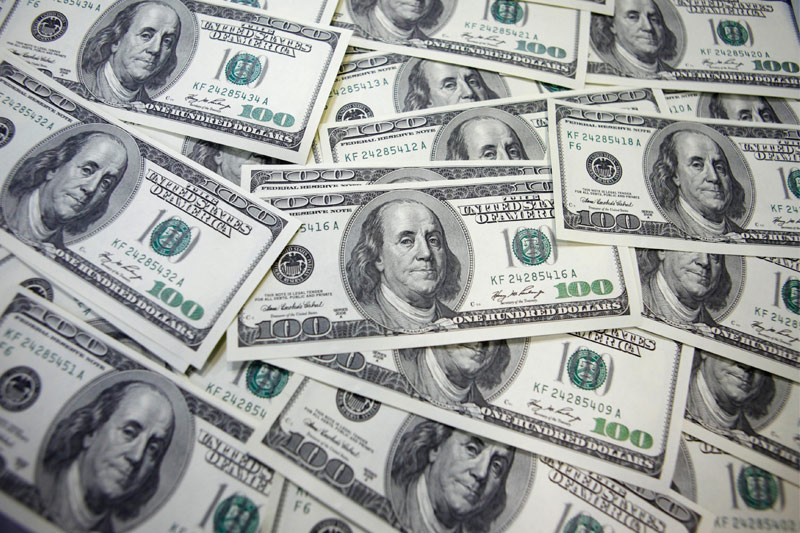Investing.com - The U.S. dollar was trading in a narrow range against the other major currencies on Wednesday, as U.S. markets reopened following a two-day shutdown for Hurricane Sandy.
During U.S morning trade, the dollar was almost unchanged against the euro, with EUR/USD dipping 0.01% to 1.2958.
The euro came off session highs after data showed that manufacturing activity in the Chicago area contracted for the second consecutive month in October.
Kingsbury International said its Chicago purchasing managers’ index rose to 49.9 in October from a reading of 49.7 the previous month. Analysts had expected the index to improve to 50.0 in October.
Earlier Wednesday, Spanish Prime Minister Mariano Rajoy said his country needs the help of the European Union to meet its budget goals, before adding that EU progress on a banking union would allow leeway on making a formal request for aid.
Speaking in the Spanish Parliament, Mr. Rajoy also said that an agreement on direct bank recapitalization is getting closer and that such an agreement would improve market confidence.
Elsewhere, official data showed that the unemployment rate in the euro zone climbed to a record 11.6% in September, from an upwardly revised 11.5% in August, adding to concerns over the deepening impact of the region’s debt crisis.
Earlier Wednesday, official data showed that German retail sales rose 1.5% in September, the fastest pace since June 2011, easily beating expectations for a 0.3% increase.
The greenback was lower against the pound, with GBP/USD rising 0.24% to 1.6111.
Sentiment on sterling remained underpinned after stronger-than-expected retail sales data from the Confederation of British Industry on Tuesday dampened expectations for more easing by the Bank of England and fuelled hopes for a sustained economic recovery.
Elsewhere, the greenback was higher against the yen, with USD/JPY up 0.30% to 79.86, but slid lower against the Swiss franc, with USD/CHF down 0.16% to 0.9308.
The greenback was little changed against its Canadian, Australian and New Zealand counterparts, with USD/CAD inching up 0.03% to 0.9996, AUD/USD up 0.04% to 1.0368 and NZD/USD easing up 0.11% to trade at 0.8216.
The Canadian dollar erased early gains after official data showed that the Canadian economy contracted by 0.1% in August, compared to expectations for growth of 0.2%.
The dollar index, which tracks the performance of the greenback versus a basket of six other major currencies, inched up 0.01% to 80.01.
Also Wednesday, the euro group of euro zone finance ministers held discussions on Greece’s progress towards meeting austerity targets.
Following the talks, the ministers urged Greek authorities "to solve remaining issues” and said they would hold further discussions on November 12 after they have received the troika’s report on Greece.
During U.S morning trade, the dollar was almost unchanged against the euro, with EUR/USD dipping 0.01% to 1.2958.
The euro came off session highs after data showed that manufacturing activity in the Chicago area contracted for the second consecutive month in October.
Kingsbury International said its Chicago purchasing managers’ index rose to 49.9 in October from a reading of 49.7 the previous month. Analysts had expected the index to improve to 50.0 in October.
Earlier Wednesday, Spanish Prime Minister Mariano Rajoy said his country needs the help of the European Union to meet its budget goals, before adding that EU progress on a banking union would allow leeway on making a formal request for aid.
Speaking in the Spanish Parliament, Mr. Rajoy also said that an agreement on direct bank recapitalization is getting closer and that such an agreement would improve market confidence.
Elsewhere, official data showed that the unemployment rate in the euro zone climbed to a record 11.6% in September, from an upwardly revised 11.5% in August, adding to concerns over the deepening impact of the region’s debt crisis.
Earlier Wednesday, official data showed that German retail sales rose 1.5% in September, the fastest pace since June 2011, easily beating expectations for a 0.3% increase.
The greenback was lower against the pound, with GBP/USD rising 0.24% to 1.6111.
Sentiment on sterling remained underpinned after stronger-than-expected retail sales data from the Confederation of British Industry on Tuesday dampened expectations for more easing by the Bank of England and fuelled hopes for a sustained economic recovery.
Elsewhere, the greenback was higher against the yen, with USD/JPY up 0.30% to 79.86, but slid lower against the Swiss franc, with USD/CHF down 0.16% to 0.9308.
The greenback was little changed against its Canadian, Australian and New Zealand counterparts, with USD/CAD inching up 0.03% to 0.9996, AUD/USD up 0.04% to 1.0368 and NZD/USD easing up 0.11% to trade at 0.8216.
The Canadian dollar erased early gains after official data showed that the Canadian economy contracted by 0.1% in August, compared to expectations for growth of 0.2%.
The dollar index, which tracks the performance of the greenback versus a basket of six other major currencies, inched up 0.01% to 80.01.
Also Wednesday, the euro group of euro zone finance ministers held discussions on Greece’s progress towards meeting austerity targets.
Following the talks, the ministers urged Greek authorities "to solve remaining issues” and said they would hold further discussions on November 12 after they have received the troika’s report on Greece.
